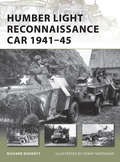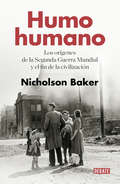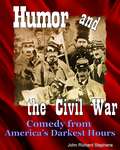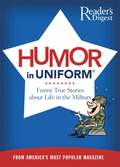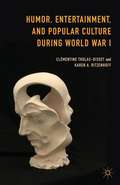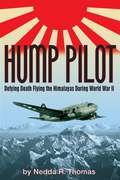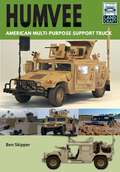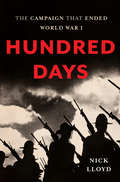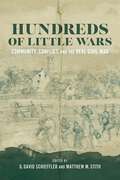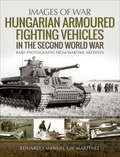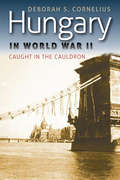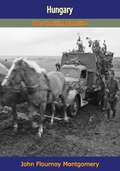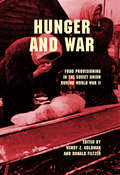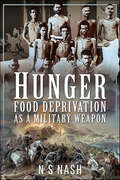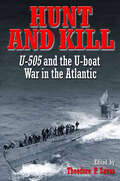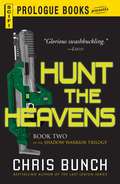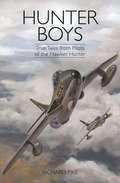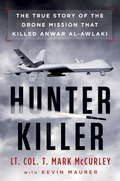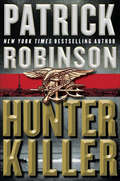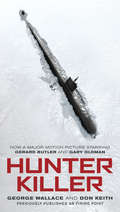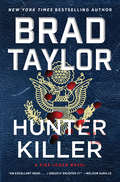- Table View
- List View
Humber Light Reconnaissance Car 1941-45
by Henry Morshead Richard DohertyThe iconic vehicle of the British Army's Reconnaissance Corps during World War II, the Humber Light Reconnaissance Car (LRC) saw service in several theatres of war between 1941 and 1945. The Humber LRC gave excellent service to the Reconnaissance Corps with its agility, speed and height proving to be invaluable assets to the units that operated it. Using numerous photographs, and newly commissioned artwork, this book looks at the development of the LRC, its use by the Reconnaissance Corps and its importance to British infantry divisions in the theater in which it served.
Humo humano: Los orígenes de la Segunda Guerra Mundial y el fin de la civilización
by Nicholson BakerUn libro inolvidable que tendrá un profundo efecto sobre nuestra visión de los acontecimientos históricos que culminaron en la Segunda Guerra Mundial y que contiene un sentido lamento por la irreparable pérdida que la humanidad se ha causado a sí misma. No es fácil aplicar una luz distinta a acontecimientos muy conocidos, pero eso es lo que logra Nicholson Baker en esta extraordinaria historia de los orígenes de la Segunda Guerra Mundial. A partir de fragmentos extraídos de periódicos y revistas de la época, discursos radiofónicos, panfletos, diarios y libros de memorias, entre otras fuentes, ordenados cronológicamente, Baker crea un mosaico de momentos decisivos, de barbarie, sufrimiento y compasión, de iluminadores destellos sobre escenas cotidianas e históricas. Una obra coral que, setenta años después, nos deja oír las voces de los líderes políticos y sus opositores, escritores, periodistas, militares y pacifistas, testimonios que ilustran de manera conmovedora el imparable y horrible avance hacia la guerra global y el holocausto. Elogiado por la crítica y los lectores por su capacidad de observación y su límpida prosa, Baker ha creado una narración que se desarrolla elegante, trágica y convincentemente. Reseñas:«Este libro absolutamente extraordinario -imposible de abandonar, imposible de olvidar- podría convertirse en el argumento más convincente en favor de la paz jamás construido. Este inventario meticulosamente seleccionado por Nicholson Baker muestra con asombroso y fascinante detalle el imparable descenso de la humanidad hacia la locura de la guerra.»Simon Winchester «Lentamente, a medida que lees, como consecuencia de la variedad en el tono y de la naturaleza trágica o terrible de la cita, así como de lo certero de su elección, Humo humano se vuelve apasionante y fascinante. Sin embargo, las cuestiones que Baker quiere plantear y el descarnado estilo que emplea para hacerlo, hacen de su libro una contribución seria y convencida al debate sobre el pacifismo. Ha creado un apasionante y elocuente ataque a la idea de que la elección deliberada de objetivos civiles pueda estar nunca justificada.»Colm Tóibín, The New York Times «Baker se vuelve especialmente interesante y provocativo al intentar demostrar que los terribles horrores del nazismo reafirman la postura pacifista.»Piers Brendon, The Guardian «Un libro que me ha encantado. Fascinante, sobrecogedor, instructivo, apasionante.»A.C. Grayling, The Times «Un fascinante y audaz experimento histórico literario, hay que aplaudir la originalidad y sutileza de su enfoque. Humo humano merece una entusiasta acogida.»Geoff Dyer, The Financial Times «Un texto coral en el que son los protagonistas quienes toman la palabra. [...]El resultado es perturbador, como si, de pronto, hubieran sido convocados a escena todos los silencios, todos los equívocos imprescindibles para que la historia de la II Guerra Mundial se pueda seguir contando como hasta ahora.»José María Ridao, El País
Humor and the Civil War: Comedy from America's Darkest Hours
by Mark Twain Bret Harte Ambrose Bierce Josh Billings Artemus Ward John Richard Stephens Alf Burnett Orpheus C. Kerr Petroleum V. NasbyPresident Abraham Lincoln said he wouldn't have been able to survive the Civil War without his jokes and amusing stories. That war was by far the greatest struggle the United States has ever faced. More Americans died in the Civil War than in all of the other wars combined. Americans--both North and South--endured very hard times and suffered terrible tragedies, and yet they maintained their sense of humor. They even printed jokes on the front page of newspapers, mixed in with the top news stories.Mark Twain is, of course, the most famous humorist of the nineteenth century, but there were others who were famous then that aren't quite as well known now. What they wrote still holds up well today and deserves to be revived. These humorists include Abraham Lincoln's favorites: Artemus Ward, Orpheus C. Kerr, and Petroleum V. Nasby. There's also Josh Billings, Alf Burnett, Bret Harte, and Ambrose Bierce. Even Abraham Lincoln himself was noted for his many funny stories and jokes. And people were still writing humorous stories involving the war at the end of the century, when O. Henry came along. This book includes all of them, along with some rare pieces by Mark Twain.Here's just one example: "During the war a Southern editor, wishing to compliment Confederate General Pillow, wrote a notice of him, in which the General was called the 'battle-scarred hero,' but the typesetter made the phrase read, the 'battle-scared hero.' On reading the notice, the irate soldier hied himself to the newspaper office, and demanded a correction. This was promised, and the next day's paper spoke of General Pillow as a 'bottle-scarred hero.'"This book draws together the very best of the Civil War's humor, parodies, burlesques, funny anecdotes, jokes, satire, personal experiences, tall tales, and wit. Retrieved through extensive research from books, newspapers, speeches, letters, and personal diaries, some of this material hasn't been published since the war. (345 pgs., 8 ill.)
Humor in Uniform: Funny True Stories about Life in the Military
by Editors of Reader's DigestIf laughter is the best medicine, then look no further to cure whatever ails you. The column “Offbase,” formally known as “Humor in Uniform,” has appeared in the Reader's Digest magazine for over half a century, and has published more than 3,500 jokes, quotes, and funny stories from the more than a million readers who have submitted them. This volume—from the world’s #1 source of humor—contains laugh-out-loud gems from one of Reader’s Digest’s most popular columns.<p> This side-splitting collection of humor delivers hundreds of the best jokes, anecdotes, cartoons, quotes, and stories from men and women in the armed forces or their families proving that life is often funnier than fiction.
Humor, Entertainment, and Popular Culture during World War I
by Karen A. Ritzenhoff Clémentine Tholas-DissetHumor and entertainment were vital to the war effort during World War I. While entertainment provided relief to soldiers in the trenches, it also built up support for the war effort on the home front. This book looks at transnational war culture by examining seemingly light-hearted discourses on the Great War.
Hump Pilot
by Nedda R. ThomasNedda R. Thomas flies her father's war through his remembrance in her superlative biography, "Hump Pilot: Defying Death Flying the Himalayas in World War II." In a lucid, informative, well-paced style she conveys the surreal beauty and deadly dangers of the Hump Theater, a story of courage and historical significance that takes our hearts into the sky. A seminary-trained spiritual director, Nedda grew up in the U.S., Paris, France, and the Far East. She has the rare distinction of being one of the very few women ever to write about men on combat-rated air missions in that world conflict. Her articles explore the work of a variety of creative and well-known figures. A poet and former editor, she speaks on military and women's history, and always, her passion for human rights, particularly for exploited children.
Humvee: American Multi-Purpose Support Truck (LandCraft)
by Ben SkipperWith its characteristic wide track, low silhouette and its distinctively deep exhaust note the Humvee sets itself apart from the range of light utility trucks it replaced. Fully air-portable, the Humvee features an aluminum body seated on a steel ladder chassis, powered by a 190hp V8 engine. Introduced into service in 1985, the Humvee remained pretty much unnoticed until its baptism of fire during the invasion of Panama in Operation Just Cause. It wasn’t until almost a year later, in Operation Desert Shield and Desert Storm that the Humvee really came into the public eye. As a result of its newly found fame its manufacturer, American Motors General, started to produce a civilized version for public consumption, with sales and profile boosted by Hollywood patronage. At the same time the Humvee continued to serve in some of the most dangerous US operations undertaken to date. From the streets of Mogadishu to the Balkans, the Humvee developed into a vehicle far removed from its original design intentions. With some 17 variants now in service, from the basic troop carrier to the awesome Avenger Anti-Aircraft system, this Humvee LandCraft title provides the modeler with a rich vein of inspirations and subject. This title looks at the process behind the design and development of the Humvee and how American Motors General were able to fulfill a complex design brief to deliver a single vehicle that was able to replace a host of in-service vehicles. This title will chart how the Humvee grew from a light utility truck into a versatile platform whose modesty hides its potential. With its specially designed track, impressive ground clearance, waterproofed electronics and ability to carry a one ton load, the first Humvees were light years ahead of the vehicles they replaced. With its unique suspension and transmission systems to its unique engine arrangement this 4x4 is capable of feats normally only afforded to tracked vehicles. With some 17 versions in US service the Humvee fulfills its traditional role as cargo and troop carrier as well as special-weapons platform, ambulances, Direct Air Support vehicles and communications shelter vehicles. After 35 years of service the Humvee has changed from soft skinned run-about to a lightly armored force protection asset. Fitted with a larger engine, interchangeable armor, specially designed escape windows and a unique blast chimney, the Humvee’s story is indeed proof that development of military vehicles never stops. For the modeler there is nothing more important than the little things and this image-rich section of LandCrafts’ Humvee title delivers the goods. Filled with crisp images that chart the Humvee’s development, combined with informative accompanying text, forms an enviable visual guide for the enthusiast and modeler alike.
Hundred Days: The Campaign That Ended World War I
by Nick LloydIn the late summer of 1918, after four long years of senseless, stagnant fighting, the Western Front erupted. The bitter four-month struggle that ensued--known as the Hundred Days Campaign--saw some of the bloodiest and most ferocious combat of the Great War, as the Allies grimly worked to break the stalemate in the west and end the conflict that had decimated Europe. In Hundred Days, acclaimed military historian Nick Lloyd leads readers into the endgame of World War I, showing how the timely arrival of American men and materiel--as well as the bravery of French, British, and Commonwealth soldiers--helped to turn the tide on the Western Front. Many of these battle-hardened troops had endured years of terror in the trenches, clinging to their resolve through poison-gas attacks and fruitless assaults across no man’s land. Finally, in July 1918, they and their American allies did the impossible: they returned movement to the western theater. Using surprise attacks, innovative artillery tactics, and swarms of tanks and aircraft, they pushed the Germans out of their trenches and forced them back to their final bastion: the Hindenburg Line, a formidable network of dugouts, barbed wire, and pillboxes. After a massive assault, the Allies broke through, racing toward the Rhine and forcing Kaiser Wilhelm II to sue for peace. An epic tale ranging from the ravaged fields of Flanders to the revolutionary streets of Berlin, Hundred Days recalls the bravery and sacrifice that finally silenced the guns of Europe.
Hundreds of Little Wars: Community, Conflict, and the Real Civil War (Conflicting Worlds: New Dimensions of the American Civil War)
by Matthew M. Stith G. David SchiefflerFrom Texas to Virginia, towns, regions, counties, regiments, prisons, and even refugee camps played a significant role in shaping the contours of the Civil War. According to historian Daniel E. Sutherland, whose many books and essays helped establish the field of community studies, these varied assemblages of individuals experienced and fought the real war. Following his lead, the contributors to Hundreds of Little Wars reveal how viewing the war from the vantage point of singular communities allows us to better understand the larger conflict. The volume includes contributions from a wide array of Civil War scholars. Lesley J. Gordon and Eric P. Totten examine military outfits, namely the 126th New York Regiment and the 4th New Hampshire Volunteer Infantry. Madeleine C. Forrest provides an analysis of Fauquier County, Virginia, in 1862, and Matthew M. Stith evaluates a Confederate prisoner-of-war camp in East Texas. Christopher Phillips and Scott A. Tarnowieckyi investigate the middle border region spanning the Ohio, Mississippi, and Missouri rivers. Lorien Foote and G. David Schieffler assess the demographically diverse Sea Islands of South Carolina and Georgia, as well as Helena, Arkansas. Barton A. Myers and Terry L. Beckenbaugh employ Sutherland’s framing while considering irregular war, first with an examination of partisan officers and then with a survey of the White River Valley in Arkansas. Finally, Niels Eichhorn and Michael Shane Powers assume a transnational viewpoint, comparing Richmond with Vienna, Austria, and analyzing a community of Confederate veterans in Central America.The essays in Hundreds of Little Wars show that no one single conflict defined the Civil War. Instead, hundreds of wars existed, variously categorized by geography, race, gender, environment, and myriad other factors. Only by concentrating on these communities can we grasp the scope and complexity of the Civil War.
Hungarian Armoured Fighting Vehicles in the Second World War (Images of War)
by Eduardo Manuel MartínezThis WWII history vividly captures the Hungarian tanks and military vehicles that fought in Central and Eastern Europe through rare wartime photographs. The Kingdom of Hungary emerged from the Great Depression as a staunch ally of Germany and Italy. In the Second World War, the Central European country not only organized its armed forces in support of the Axis Powers, but also developed its own military industry to supply weapons and equipment to its troops. The Hungarian military produced all kinds of weapons, vehicles and armored vehicles, although they were generally under-gunned and under-armored. This book explores Hungary's participation in the Second World War through superb photographs showcasing its varieties of armored fighting vehicles. Wartime images take the reader from the beginning of the USSR campaign all the way to the bloody Siege of Budapest and the last clashes in Austrian and Slovenian territory before the army's unconditional surrender.
Hungarian Armoured Fighting Vehicles in the Second World War (Images of War)
by Eduardo Manuel MartínezThis WWII history vividly captures the Hungarian tanks and military vehicles that fought in Central and Eastern Europe through rare wartime photographs. The Kingdom of Hungary emerged from the Great Depression as a staunch ally of Germany and Italy. In the Second World War, the Central European country not only organized its armed forces in support of the Axis Powers, but also developed its own military industry to supply weapons and equipment to its troops. The Hungarian military produced all kinds of weapons, vehicles and armored vehicles, although they were generally under-gunned and under-armored. This book explores Hungary's participation in the Second World War through superb photographs showcasing its varieties of armored fighting vehicles. Wartime images take the reader from the beginning of the USSR campaign all the way to the bloody Siege of Budapest and the last clashes in Austrian and Slovenian territory before the army's unconditional surrender.
Hungary in World War II: Caught in the Cauldron (World War II: The Global, Human, and Ethical Dimension)
by Deborah S. CorneliusThe story of Hungary's participation in World War II is part of a much larger narrative—one that has never before been fully recounted for a non-Hungarian readership. As told by Deborah Cornelius, it is a fascinating tale of rise and fall, of hopes dashed and dreams in tatters. Using previously untapped sources and interviews she conducted for this book, Cornelius provides a clear account of Hungary’s attempt to regain the glory of the Hungarian Kingdom by joining forces with Nazi Germany—a decision that today seems doomed to fail from the start. For scholars and history buff s alike, Hungary in World War II is a riveting read.Cornelius begins her study with the Treaty of Trianon, which in 1920 spelled out the terms of defeat for the former kingdom. The new country of Hungary lost more than 70 percent of the kingdom’s territory, saw its population reduced by nearly the same percentage, and was stripped of five of its ten most populous cities. As Cornelius makes vividly clear, nearly all of the actions of Hungarian leaders during the succeedingdecades can be traced back to this incalculable defeat.In the early years of World War II, Hungary enjoyed boom times—and the dream of restoring the Hungarian Kingdom began to rise again. Caught in the middle as the war engulfed Europe, Hungary was drawn into an alliance with Nazi Germany. When the Germans appeared to give Hungary much of its pre–World War I territory, Hungarians began to delude themselves into believing they had won their long-sought objective. Instead, the final year of the world war brought widespread destruction and a genocidal war against Hungarian Jews. Caught between two warring behemoths, the country became a battleground for German and Soviet forces. In the wake of the war, Hungary suffered further devastation under Soviet occupation and forty-five years of communist rule.The author first became interested in Hungary in 1957 and has visited the country numerous times, beginning in the 1970s. Over the years she has talked with many Hungarians, both scholars and everyday people. Hungary in World War II draws skillfully on these personal tales to narrate events before, during, and after World War II. It provides a comprehensive and highly readable history of Hungarian participation in the war, along with an explanation of Hungarian motivation: the attempt of a defeated nation to relive its former triumphs.
Hungary: The Unwilling Satellite
by John Flournoy MontgomeryIn 1947, the former U.S. Minister to Hungary, John Flournoy Montgomery, published these heartfelt memoirs of his Budapest days during World War II. The book was, and remains, a widely read and widely quoted source for examinations of Hungarian pre-war politics, in some measure because it is unique as a thorough Western lens on interwar Hungary.
Hunger and War
by Donald A. Filtzer Wendy Z. GoldmanDrawing on recently released Soviet archival materials, Hunger and War investigates state food supply policy and its impact on Soviet society during World War II. It explores the role of the state in provisioning the urban population, particularly workers, with food; feeding the Red army; the medicalization of hunger; hunger in blockaded Leningrad; and civilian mortality from hunger and malnutrition in other home front industrial regions. New research reported here challenges and complicates many of the narratives and counter-narratives about the war. The authors engage such difficult subjects as starvation mortality, bitterness over privation and inequalities in provisioning, and conflicts among state organizations. At the same time, they recognize the considerable role played by the Soviet state in organizing supplies of food to adequately support the military effort and defense production and in developing policies that promoted social stability amid upheaval. The book makes a significant contribution to scholarship on the Soviet population's experience of World War II as well as to studies of war and famine.
Hunger: Food Deprivation as a Military Weapon
by N. S. NashThroughout the ages, more combatants and civilians have died in war of the effects of starvation and resulting disease than have been killed by bullet or bomb. The author of this fascinating work argues that, over the last 160 years, conflicts have been decided not just on the battlefield but by the denial of an adversary’s access to food. The starvation that followed led to military indiscipline, social unrest, and a failure of governance. Numerous examples prove his point, not least Germany in 1919. The Union blockade of the Confederacy in 1861 was a major factor in the outcome of the Civil War as was the American strategy against Japan in 1943-1945. The fates of besieged forces both at Vicksburg in 1863 and the British at Kut in 1916 were sealed when control of their respective supply routes was lost. Churchill’s fears over Hitler’s U-boat campaign were well justified. ‘Logistics’ is a modern word, but it describes a fundamental element of generalship, amply demonstrated at Metz in 1870 when logistic illiteracy resulted in a vast and hitherto undefeated French army having no option but to surrender. This thought-provoking book vividly demonstrates that extreme hunger is the precursor to starvation and, consequently, almost inevitable defeat. It proves that deprivation of food is a potent weapon that no commander can ignore.
Hunt and Kill: U-505 and the Battle of the Atlantic
by Theodore P. SavasOne of WWII's pivotal events was the capture of U-505 on June 4, 1944. The top secret seizure of this massive Type IX submarine provided the Allies with priceless information on German technology and innovation. After the war U-505 was transported to Chicago, where today 1,000,000 visitors a year pass through her at the Museum of Science and Industry. Hunt and Kill offers the first definitive study of U-505. The chapters cover her construction, crew and commanders, combat history, general Type IX operations, naval intelligence, the eight fatal German mistakes that doomed the boat, and her capture, transportation, and restoration for posterity. The contributors to this fascinating volume--a Who's Who of U-boat historians--include: Erich Topp (U-Boat Ace, commander of U-552); Eric Rust (Naval Officers Under Hitler); Timothy Mulligan (Neither Sharks Nor Wolves); Jak Mallman Showell (Hitler's U-boat Bases); Jordan Vause (Wolf); Lawrence Patterson (First U-boat Flotilla); Mark Wise (Enigma and the Battle of the Atlantic); Keith Gill (Curator, Museum of Science and Industry), and Theodore Savas (Silent Hunters; Nazi Millionaries).
Hunt the Heavens
by Chris BunchBounty hunter. Federation intelligence agent. Former prisoner of the terrifying Al'ar. Joshua Wolfe had been all those things. Now he's on the hunt for secrets amid the ruble of the Great War.The Federation want the secrets to stay hidden, as does the Chitet cult, who have their own interests in the Al'ar. Wolfe will have to fight them all as he travels from a mothballed fleet of starships to a lethal world of robot protectors . . . and finally, face to face with an enemy more terrible than any mankind has faced.The future lies in the hands of the Shadow Warrior.
Hunt the Heavens: Book Two of the Shadow Warrior Trilogy
by Chris BunchBounty hunter. Federation intelligence agent. Former prisoner of the terrifying Al'ar. Joshua Wolfe had been all those things. Now he's on the hunt for secrets amid the ruble of the Great War. The Federation want the secrets to stay hidden, as does the Chitet cult, who have their own interests in the Al'ar. Wolfe will have to fight them all as he travels from a mothballed fleet of starships to a lethal world of robot protectors . . . and finally, face to face with an enemy more terrible than any mankind has faced. The future lies in the hands of the Shadow Warrior.
Hunt the Heavens: Book Two of the Shadow Warrior Trilogy
by Chris BunchBounty hunter. Federation intelligence agent. Former prisoner of the terrifying Al’ar. Joshua Wolfe had been all those things. Now he’s on the hunt for secrets amid the ruble of the Great War.The Federation want the secrets to stay hidden, as does the Chitet cult, who have their own interests in the Al’ar. Wolfe will have to fight them all as he travels from a mothballed fleet of starships to a lethal world of robot protectors . . . and finally, face to face with an enemy more terrible than any mankind has faced.The future lies in the hands of the Shadow Warrior.
Hunted (FBI Heat #1)
by Marissa GarnerFor San Diego's elite FBI agents, risking their lives is standard procedure when it comes to capturing the city's most dangerous criminals-but falling in love is the greatest risk of all. Catching bad guys in San Diego's underworld isn't just FBI Special Agent Ben Alfren's job, it's his life. He doesn't have time for a serious relationship, doesn't want one either. So when he meets his sexy new neighbor, Amber Jollett, he has nothing more in mind than unwinding with a glass of wine, a romantic walk on the beach...and maybe a hot fling.But Amber is more than he bargained for. Her job as a nurse has brought her face-to-face with women caught in a human trafficking ring, women she's determined to help. As Ben and Amber plot to rescue the women, the attraction between them flares into passion. But they'll learn that in this dangerous game of cat and mouse, real love can save - or doom - them . . .
Hunter Boys: True Tales from Pilots of the Hawker Hunter (The\jet Age Ser. #2)
by Richard Pike&“Entertaining and informative tales of success, heroics, fear, relief and exhilaration in and around the Hunter cockpit&” (Royal Air Force Historical Society Journal). From the author of Lightning Boys, this is a fascinating look at the experiences of those who flew the iconic Hawker Hunter. Fifteen aircrew relate their individual recollections of the highs and lows, the dramas and demands of this incredible aircraft, which came into service in July 1951 and changed the future of fighter development. Included are a chapter by Neville Duke, Hawker Aircraft&’s chief test pilot, and other tales recounting the Aden emergency, the 1971 Indo-Pakistan war, and a race against the odds in Gibraltar. These true stories demonstrate the exceptional performance of this aircraft and illustrate its renowned lengthy service with the RAF and internationally—brought to life with original photographs plus paintings by acclaimed aviation artist Chris Stone.
Hunter Killer
by Kevin Maurer T. Mark MccurleyThe first-ever inside look at the US military's secretive Remotely Piloted Aircraft program--equal parts techno-thriller, historical account, and war memoirRemotely piloted aircraft (RPA), commonly referred to by the media as drones, are a mysterious and headline-making tool in the military's counterterrorism arsenal. Their story has been pieced together by technology reporters, major newspapers, and on-the-ground accounts from the Middle East, but it has never been fully told by an insider.In Hunter Killer, Air Force Lt. Col. T. Mark McCurley provides an unprecedented look at the aviators and aircraft that forever changed modern warfare. This is the first account by an RPA pilot, told from his unique-in-history vantage point supporting and executing Tier One counterterrorism missions. Only a handful of people know what it's like to hunt terrorists from the sky, watching through the electronic eye of aircraft that can stay aloft for a day at a time, waiting to deploy their cutting-edge technology to neutralize threats to America's national security.Hunter Killer is the counterpoint to the stories from the battlefront told in books like No Easy Day and American Sniper: While special operators such as SEALs and Delta Force have received a lot of attention in recent years, no book has ever told the story of the unmanned air war. Until now.From the Hardcover edition.
Hunter Killer (Arnold Morgan #8)
by Patrick RobinsonAmerican military forces race to prevent a coup in the Middle East in this thriller by the New York Times–bestselling author of Scimitar SL-2.Saudi Arabia, the world’s leading producer of oil, is on the brink of revolution. Inside the opulent palaces and lavish mansions, the royal family is ransacking the country’s dwindling coffers while the desert kingdom seethes with unrest. Appalled at his family’s extravagant lifestyle, Crown Prince Nasir vows to end the careless and destructive rule, and sets in motion a top-secret operation to destroy the Saudi oil industry and bankrupt the monarch. To do so, he must enlist the help of an ally, a naval power willing to help in return for a share of the wealth.Nasir turns to France, with its lethal Hunter Killer submarines, capable of inflicting devastating damage on the massive oil installations along the shores of the Red Sea and in the Persian Gulf. Objective: To shift the power structure of the world’s oil giant.Under the command of the mysterious and lethally effective Colonel Jacques Gamoudi—nicknamed “Le Chasseur,” or “The Hunter—the ferocious battle for the desert kingdom begins. As the world’s oil markets plunge into chaos, United States Admiral Arnold Morgan, former Security Adviser to the President, and Lieutenant Commander Jimmy Ramshawe are summonded to the White House, where they learn that Gamoudi has been joined by none other than Morgan’s archenemy, Hamas General Ravi Rashood, in the battle for the capital city of Riyadh.Now Le Chasseur becomes the hunted, by both French and American Special Forces—one trying to assassinate and silence him forever, the other desperate to take him alive and to force a public confession of France’s subversive actions.Praise for Patrick Robinson“An absolutely marvelous thriller writer.” —Jack Higgins“The new Frederick Forsyth.” —Guardian“Patrick Robinson is quickly replacing Tom Clancy as the preeminent writer of modern naval fiction.” —Florida Times-Union“One of the crown princes of the beach read-thriller.” —Stephen Coonts
Hunter Killer (Movie Tie-In)
by Don Keith George WallaceNOW A MAJOR MOTION PICTURE STARRING GERARD BUTLER AND GARY OLDMANA submarine captain races to prevent World War III in this thrilling adventure.Below the polar ice cap, an American nuclear submarine moves quietly in the freezing water, tailing a new Russian sub. But the usual, unspoken game of hide-and-seek between opposing captains is ended when the Americans hear sounds of disaster and flooding, and the Russian sub sinks in a thousand feet of water. The American sub rushes to help, only to join its former quarry in the deep. The situation ignites tensions around the world. As both Washington and Moscow prepare for what may be the beginnings of World War III, the USS Toledo—led by young, untested Captain Joe Glass—heads to the location to give aid. He soon discovers that the incident was no accident. And the men behind it have yet to make their final move. A move only Glass can stop.Previously Published As Firing Point
Hunter Killer: A Pike Logan Novel (Pike Logan #14)
by Brad TaylorPike Logan tracks highly-trained Russian assassins to Brazil in this blistering, action-packed thriller from New York Times bestselling author and former Special Forces Officer Brad Taylor. <P><P>Pike Logan and the Taskforce were once the apex predators, an unrivaled hunting machine that decimated those out to harm the United States, but they may have met their match. While Pike Logan and Jennifer Cahill prepare to join their team on a counter-terrorist mission in the triple frontier—the lawless tri-border region where Argentina, Brazil, and Paraguay meet—they are targeted in Charleston, South Carolina. <P><P>A vicious explosion kills a friend, and the perpetrators have set it up to look like an accident. While the authorities believe this was not foul play, Pike knows the attack was meant for him. When he loses contact with the team in South America, Pike is convinced he and the Taskforce are under assault. His men are the closest thing to family that Pike has, which means he will do anything, even ignore direct orders to stand down, to find them. <P><P>Pike and Jennifer head to Brazil to investigate their disappearance and run headlong into a crew of Russian assassins. Within days they are entangled in a byzantine scheme involving Brazilian politics and a cut-throat battle for control of offshore oil fields. Forged in combat, the Russians are the equal of anything the Taskforce has encountered before, but they make a mistake in attacking Pike’s team, because Pike has a couple of elite Israeli assassins of his own. And Pike will stop at nothing to protect his family. <P><P><b>A New York Times Bestseller</b>
